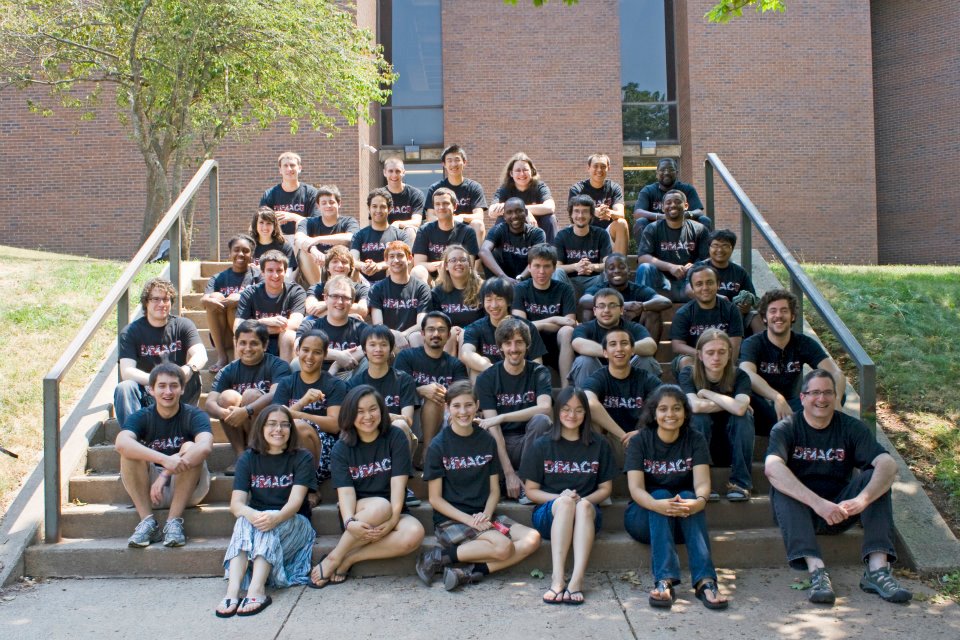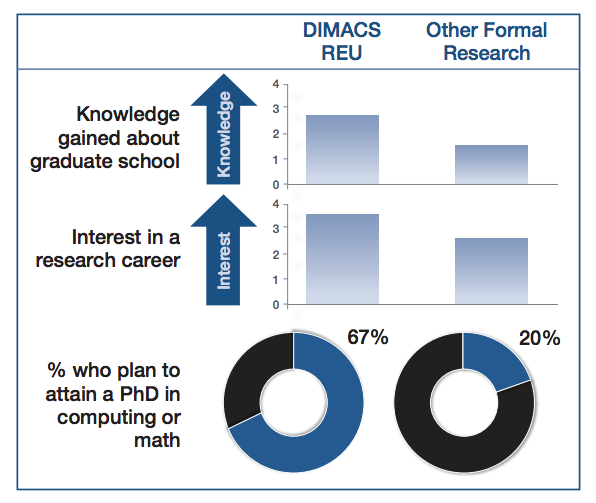[February, 2014] A recent report by the Center for Evaluating the Research Pipeline (CERP) finds that the DIMACS Research Experiences for Undergraduates (REU) program is doing a good job informing and inspiring students about graduate school.
DIMACS has hosted undergraduates for summer research experiences since its early years as a center. Over time, the DIMACS REU program has grown and evolved – in 2013 there were nearly 40 students immersed in our unique multidisciplinary environment. If it’s summer at DIMACS, you can bet that office space will be in short supply, but the corridors (and offices) will be brimming with creative energy.

Our REU program is comprised of a DIMACS NSF REU Site that joins with other REU programs all running concurrently at DIMACS. The other programs include those from CCICADA (the DHS Center of Excellence based at DIMACS), the Mathematical Association of America’s National Research Experiences for Undergraduates Program (MAA NREUP), and the Rutgers Department of Mathematics, as well as a group of students from DIMATIA (the Center for Discrete Mathematics, Theoretical Informatics, and Applications) at Charles University in Prague, Czech Republic.
The goal of our REU program is to provide participants with a research experience that will inform future education and career choices and give students the confidence to pursue and succeed in these choices. We aim to create an environment that enriches students by exposing them to the varied perspectives offered by different cultures, different fields, by theory and application, and by industry and academia. In addition to research projects, the program includes discussions about future careers, information sessions on graduate school, and visits to DIMACS industry partners that offer a broadened view of career possibilities in the computational and mathematical sciences.
To gauge our success, we routinely survey students during the summer of their REU and periodically thereafter. While these surveys provide valuable feedback for updating and improving our program, they do not provide any insight on how we are performing relative to our peers or whether research experience ultimately leads to better-prepared students. A new report prepared by the Computing Research Association’s Center for Evaluating the Research Pipeline sheds light on these broader comparisons.
The CERP report compares student outcomes from participants in the DIMACS REU program with those of other students in computing, both with and without similar research experiences. The report summarizes findings on “career preparation” based on data collected from 12 participants in the 2012 DIMACS REU immediately after having completed the program. The report also provides findings on “career progression” based on data collected in fall 2013 from a second group of 34 students (from earlier DIMACS REU programs) who had graduated in 2011 and 2012. With respect to career preparation, the report says, “Results suggest that the DIMACS REU program may fare better than other formal research experiences in terms of preparing students for research careers and for applying to graduate programs in computing and mathematics.”
Other key findings noted in the report are: “Compared to students with other formal research experience, DIMACS participants reported:
• More overall knowledge about graduate school
• Greater impact of research experience on knowledge about graduate school
• Greater impact of research experience on plans to attend graduate school (but no difference in actual enrollment 1-2 years after undergrad)
• More motivation to attain a PhD in computing or math (but no difference in actual enrollment in PhD computing program)
• Greater interest in becoming a college or university professor
• Less interest in a non-research job (and less likely to be working in a non-research job 1-2 years after undergrad)
• Greater usefulness of faculty relationships for current career
• Similar levels of job satisfaction, professional network strength, satisfaction with undergraduate preparedness and usefulness to current career”
 Some of these findings are summarized in
the “infographic” at left, which appears in the
January 2014 issue
of Computing Research News. It shows DIMACS REU students gaining
more knowledge about graduate school and showing more interest in
attaining a PhD and pursuing a career in research. Given the small
sample size, any findings on career preparation must be viewed with
a certain amount of caution, but they are nonetheless encouraging.
Some of these findings are summarized in
the “infographic” at left, which appears in the
January 2014 issue
of Computing Research News. It shows DIMACS REU students gaining
more knowledge about graduate school and showing more interest in
attaining a PhD and pursuing a career in research. Given the small
sample size, any findings on career preparation must be viewed with
a certain amount of caution, but they are nonetheless encouraging.